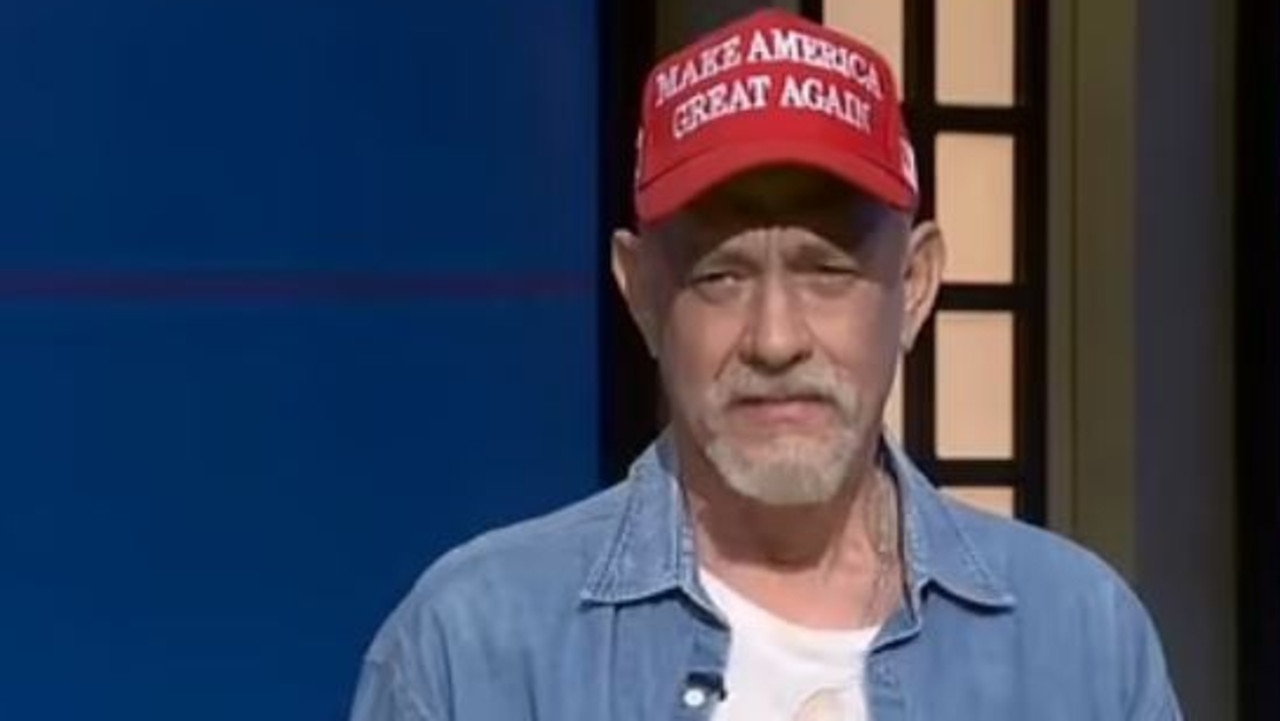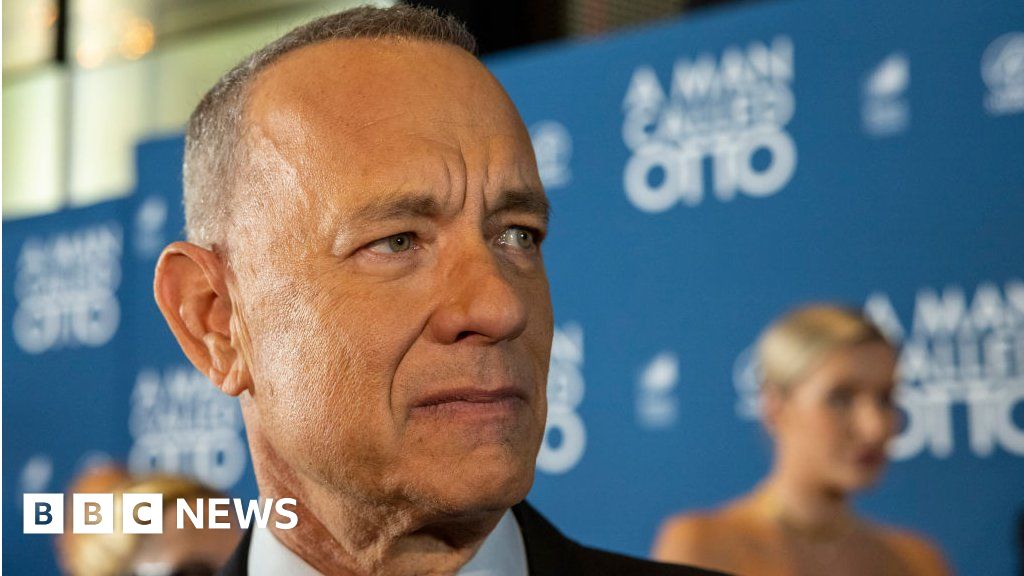Did Tom Hanks, a beloved figure in Hollywood, intentionally stir the pot with his recent Saturday Night Live appearance, or was it simply a case of artistic license gone awry? The truth is, Hanks portrayal of a Trump supporter, complete with a MAGA hat and a reluctance to shake hands with a Black man, ignited a firestorm of controversy, leaving many questioning the intent behind his actions and the message it conveyed.
The 50th-anniversary special of Saturday Night Live, a night meant to celebrate comedic history, has become a focal point for a heated debate surrounding political satire, celebrity activism, and the ever-sensitive topic of race. Hanks, a veteran actor known for his ability to embody a diverse range of characters, found himself at the center of the storm due to his reprisal of the "Doug" character, originally introduced in 2016. This character, a white Trump supporter from a rural background, was revisited with a few notable updates that, for many, crossed the line.
| Category | Details |
|---|---|
| Full Name | Thomas Jeffrey Hanks |
| Date of Birth | July 9, 1956 |
| Place of Birth | Concord, California, U.S. |
| Nationality | American |
| Spouse | Samantha Lewes (m. 1978; div. 1987), Rita Wilson (m. 1988) |
| Children | Colin Hanks, Elizabeth Hanks, Chester Hanks, Truman Hanks |
| Education | Chabot College, California State University, Sacramento |
| Occupation | Actor, Filmmaker |
| Years Active | 1977present |
| Notable Awards | Two Academy Awards for Best Actor, Four Golden Globe Awards, Seven Primetime Emmy Awards |
| Known For | Big, Forrest Gump, Philadelphia, Saving Private Ryan, Cast Away, The Terminal, Captain Phillips |
| Website | IMDB - Tom Hanks |
The controversy wasn't just about the skit itself but also about the perceived intent. Was Hanks, through his portrayal, making a statement about the political climate and its supporters, or was he merely providing a comedic take on a familiar type? The reactions were sharply divided. Some saw it as a commentary on the perceived racism within some segments of the MAGA movement, while others viewed it as a tone-deaf and insensitive caricature. The incident quickly became fodder for social media, with opinions flying back and forth, fueling the ongoing culture wars.
Adding fuel to the fire, the show included a segment where Hanks, in character, seemed hesitant to shake hands with a Black game show host. This specific action sparked outrage among many, as it appeared to play into stereotypes and reinforce divisive narratives. Former senior advisor to Robert F. Kennedy Jr., Link Lauren, echoed the sentiments of many viewers, taking to social media to express her dismay.
The situation quickly escalated beyond a simple comedic skit. Critics questioned the show's decision to include such material, suggesting it was a misstep that could alienate a significant portion of the audience. The backlash prompted reactions from various corners of the political spectrum, further amplifying the debate surrounding the role of comedy and satire in a polarized society. The event also resurrected the age-old question of whether certain topics are off-limits in comedy and where the boundaries of satire should lie.
Adding another layer of complexity to the situation, former Saturday Night Live cast member Victoria Jackson stepped into the fray, shutting down reports that she had criticized Hanks' performance. However, her presence in the narrative underscored the personal nature of the controversy and the complex web of relationships that exist within the world of comedy and entertainment.
Adding to the confusion, unfounded rumors and conspiracy theories have also been swirling around Hanks. The actor has become a target for online misinformation campaigns, with false claims and fabricated stories circulating on social media. One particularly egregious example involved the circulation of a fake BBC report alleging Hanks' arrest. This underscores the risks of public figures in the digital age, where misinformation can spread rapidly and have a significant impact on reputation. These types of rumors have been made easier to spread due to Hanks high profile status. He is, as some have described, "bait for corners of the internet spreading misinformation".
The discussion surrounding Hanks' recent performance must consider the broader context of his career. His career has been marked by iconic roles and a reputation for being one of Hollywood's most likable actors. Films like Big, Forrest Gump, and Saving Private Ryan cemented his status as a box office draw and a critical darling. His ability to take on diverse roles and portray a wide range of characters is a testament to his talent. However, this recent incident has placed him in a position where his artistic choices are not just scrutinized by critics and fans but also through the lens of political and cultural sensitivity.
The controversy surrounding Hanks and the SNL skit extends beyond mere entertainment. It reflects a deeper conversation regarding the role of celebrities and artists in shaping public opinion. As public figures, they often carry the weight of both artistic expression and social responsibility. This episode brings up the question of whether actors, comedians, and the shows they star in are obligated to consider the potential impact of their work on an increasingly divided nation. The answers, of course, are not simple.
This instance highlights how quickly and intensely opinions can be formed and disseminated in today's media landscape. Regardless of the intentions behind Hanks' performance, the impact it had is undeniable. It demonstrated how a single skit on a long-running comedy show can become a flashpoint, sparking debates about humor, identity, and the ever-evolving landscape of American culture. As Hanks and others grapple with the fallout, it becomes clear that the art of comedy, like society itself, is in constant flux.
The impact of the skit can be felt beyond just the initial viewing experience. It's evident in the online conversations, where users debated the merits and pitfalls of the performance. Its also evident in the fact that the incident has sparked renewed interest in the shows history. Even Victoria Jackson's appearance at the show sparked chatter as people tried to decide if she was criticizing or defending Hanks' actions.
The broader ramifications of this controversy extend into discussions on freedom of expression and the role of artists in society. While some defend the right of comedians to push boundaries, others argue that such freedom must be tempered by an awareness of the impact their work can have. The events surrounding Hanks appearance on SNL have once again brought these important debates to the forefront.
Hanks' career choices, including his recent appearance, raise questions about the nature of artistic expression and the pressures faced by those in the public eye. As an actor and celebrity, Hanks navigates a complex world of creative freedom and societal expectations. The choices he makes, both on and off the screen, are inevitably subject to scrutiny and debate.
Another aspect of the controversy is the speed with which rumors and misinformation can spread online. The fact that Hanks has found himself the subject of numerous false claims demonstrates the challenges of maintaining a positive public image in the digital era. The circulation of these types of rumors show that celebrities can quickly become the target of attacks and unsubstantiated claims.
The situation also raises ethical questions about the responsibility of the media. When covering such controversies, it is important for media outlets to present accurate information and avoid spreading harmful rumors. The spread of misinformation has the power to shape public opinion and cause significant harm, so the media must be responsible with the information it publishes.
The controversy provides a clear illustration of how the intersection of politics and entertainment can create significant problems. The lines are blurring as celebrities feel pressured to express their opinions on political issues, and the public is now more sensitive to the political stance of those in the entertainment industry. This interaction, while it can spark important discussions, also raises concerns about divisiveness and the potential to alienate a segment of the audience.
In conclusion, the controversy surrounding Tom Hanks and his Saturday Night Live appearance serves as a powerful reminder of the complex landscape of modern culture. It highlights the importance of considering both intent and impact when creating and consuming art, as well as the need for critical thinking and fact-checking in an age of misinformation.


